To view a list of the resources available to be reviewed, click here.
April 5, 2017
Don’t Tell Me That!
Review by Clara Gunderson
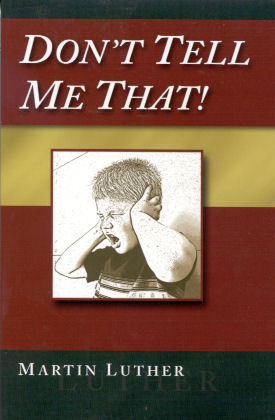
“Don’t tell me that!” cries a little boy as he covers his ears. That’s the title of the book that caught my attention as I was perusing the shelves in our Ambassador Publications’ bookstore. On the cover is a picture of a child screaming those words, with his hands over his ears. As a mother, I’ve been confronted with this situation, but even more so as a sinner myself, I relate to this child’s agony.
This book is one in a series of Luther’s writings from Lutheran Press, adapted by Paul Strawn and published in 2004.
Covering one’s ears against hearing the truth is such a natural reaction, isn’t it? The writer of the Foreword tells the story of confronting his young son with a broken toy. The father simply said, “You broke it.” Tears came, hands went up to shut the truth out, the boy’s mouth opened, and he screamed these words: “Don’t tell me that!”
Why, asks the writer, did these words devastate his son? What had happened here? Answering, he states that the Law of God had done its work. This is the setting for questions such as: “What Is Repentance?” and “Do Christians Really Need the Law?” Chapters follow to answer these questions: “Not to Make Us Right Before God, But to Expose Sin, Wrath and Death” and “Christian Repentance is Continual.”
There are twelve short chapters with several questions at the end of each one. I personally appreciated the succinctness with which Luther covered his topic and the questions posed which helped me know if I had understood. I found myself going back to reread, to capture what had been written.
The chapter that brought new understanding to me was “The Lord’s Prayer Is a Prayer of Repentance.” To quote: “For whoever prays the Lord’s Prayer rightly, confesses with his own mouth, that he sins against the Law, and for that, he is sorry.” Luther goes on to say that whoever prays that God’s name would be holy is confessing that God’s name is not yet completely holy. Though we state in the meaning to the First Petition that “God’s Name is indeed holy in itself,” we pray too “in this petition that it may be hallowed also among us.” Luther goes on to point out the focus on repentance in each petition. For centuries, he writes, the Lord’s Prayer has been prayed right before the Words of Institution and the distribution of the Lord’s Supper because it is a confession of sins.
Don’t Tell Me That is Luther’s answer to those in the church who would do away with the Law, claiming that it was fulfilled by Jesus and has no further purpose. This book and the others in the series make excellent adult Bible study material.
Clara GundersonAFLC Board of Publications and Parish EducationMilford, IL
Order your copy here: Ambassador Publications Online Store
Also Available:

Order Christians Can Be Soldiers here.

Order Did My Baptism Count? here.

Order Convicted by the Spirit here.
April 12, 2017
Luther on Music: Paradigms of Praise
Review by Andrew Hanson
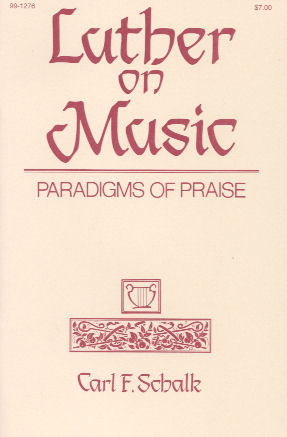
Carl Schalk, a Lutheran composer, author, and lecturer, wrote a short 56-page booklet, Luther on Music: Paradigms ofPraise. Schalk states in the preface that “the purpose [of the book] is three-fold: (1) to establish the importance of music—especially in Luther’s early life, in his education in the schools, and in his life in the monastery—in shaping his understanding of the role of music in the Christian life; (2) to show how Luther’s developing understanding of music in Christian life and worship led him to a practical and many-faceted involvement in a variety of music’s aspects; (3) to bring into sharp relief several distinct paradigms, or patterns of thought, that dominated Luther’s theological understanding of the role of music in the church’s life and ministry.” These paradigms are: Music as God’s Creation and Gift, Music as Proclamation and Praise, Music as Liturgical Song, Music as the Song of Royal Priests, and Music as a Sign of Continuity with the Whole Church. Schalk supports each of these paradigms with many quotes from Luther, mostly taken from the American Edition of Luther’s Works, and shares implications for the present day.
This booklet is written in a research-style format. One can read the first paragraph of each section and get a wonderful snapshot of what that section is. The first sentence of each paragraph perfectly sets up the remainder of the paragraph. Because it is written in this format, the reader can skim quickly and easily know which sections to invest more time.
Overall, the book leans toward a high-church/liturgical viewpoint. The quotes that Schalk chooses support his paradigms well. However, there are plenty of other quotes from Luther on music that would also support congregational and regional autonomy in regards to the structure of the worship service and the music therein.
Luther on Music: Paradigms of Praise provides a great overview of music in Luther’s life, is stocked full of direct quotes from Luther, and offers five well-supported paradigms of Luther’s understanding of the role of music in ministry.
Andrew HansonAFLBS/TS Director of MusicPlymouth, MN
Order your copy here: Ambassador Publications Online Store
Also Available:

Order Music in Early Lutheranism here.

Order Martin Luther: Hymns, Ballads, Chants, Truth here.

Order Heirs of the Reformation: Treasures of the Singing Church here.
April 19, 2017
Here I Stand: A Life of Martin Luther
Review by Pr. Eric Christenson
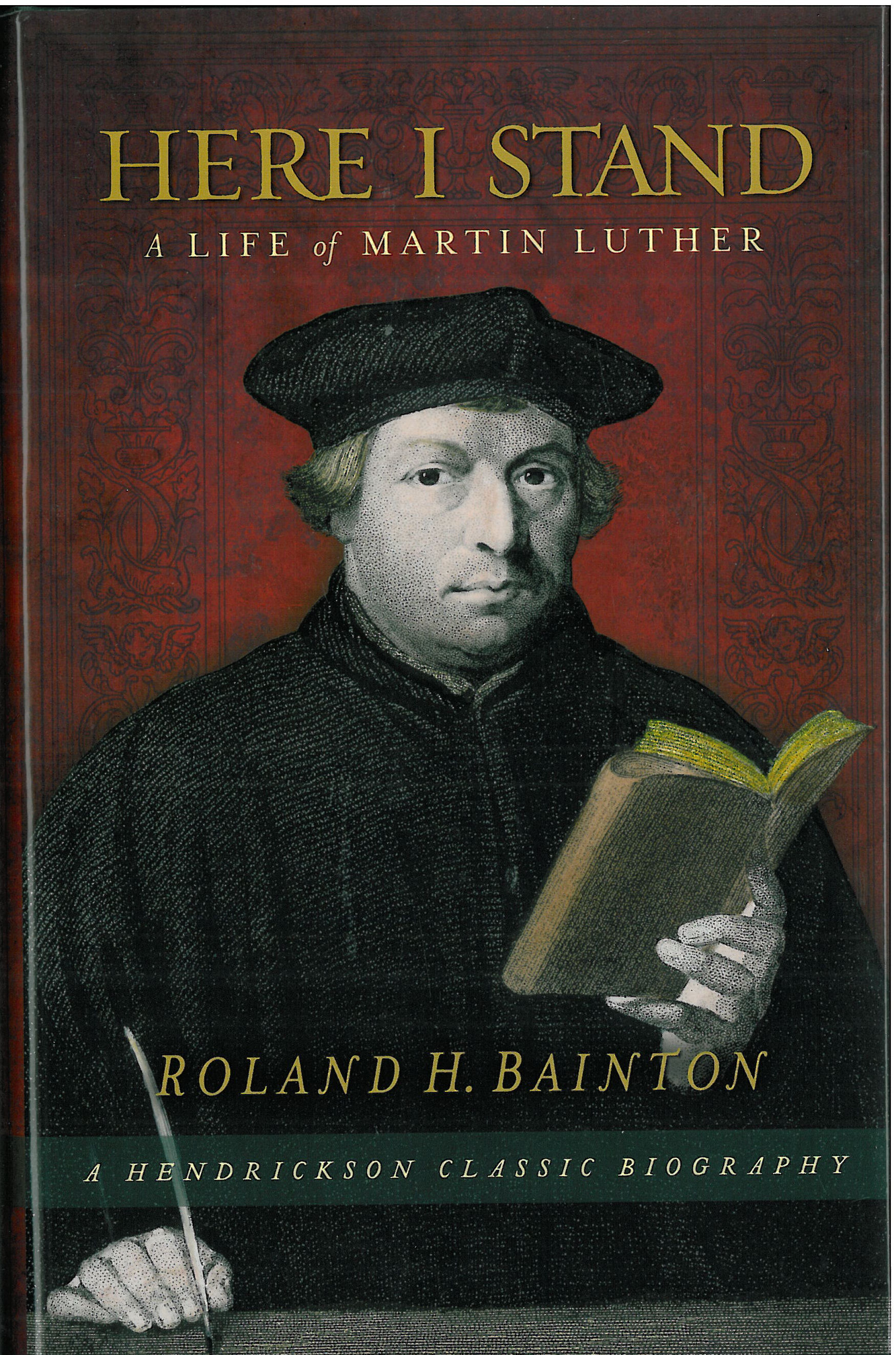
Hardcover
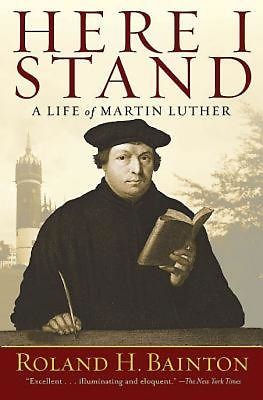
Paperback
Roland Bainton, in his landmark work on the life of Martin Luther entitled Here I Stand: A Life of Martin Luther, presents a thorough and straightforward recounting of the life of the reformer. Bainton doesn’t hide Luther’s humanity but rather shows how God used him, his struggles, his weaknesses, and experiences to shine light on the darkness which covered the Catholic Church. As one reads the book, it becomes clear that Luther never set out to be, nor thought of himself as, anything like the nearly superhero figure so many today think him. Rather, Martin Luther is consistently shown as a humble servant of God, who was held captive by the guilt of his own sin and who only found freedom in the death and resurrection of Christ. Luther’s conscience was bound to Scripture and sickened by the abuse of the church. He deeply desired for the church to be set free by the light of the Gospel of Christ. This mixture of personal torment and scriptural enlightenment birthed what we now call the Reformation.
It is no secret that Luther didn’t always have the best judgment or exhibit the strongest discernment. This can be seen in his statements concerning the Jews, Anabaptists, the papists, the Roman Empire, and even in his writings on polygamy. However, Luther was a man of convictions. A man who was deeply troubled by sin, ruthlessly attacked by the devil, buffeted by depression, and who cleaved to grace found in Jesus Christ.
Luther’s impact was and still is deeply felt, changing the course of history, not only for the Germans, but the entire Roman empire, and world. God used him as a measuring rod, striking the church and bringing reform to its practices and offering hope to broken lives. Roland Bainton does a wonderful job illustrating how God used a depressed, fearful monk as an instrument of His grace, glory, and truth. Although the book was hard to read at times due to its age and use of older language, it was enlightening and encouraging to see Luther not as a superhero bashing the mountain of the Papacy, but as a sinner striving to live in the light of the Gospel of Christ.
Pr. Eric ChristensonAmery Free Lutheran ChurchAmery, WI
Order your hardcover copy here: Ambassador Publications Online Store Order your paperback copy here: Ambassador Publications Online Store
Also Available:

Order Inside the Reformation: The Times That Changed the World here.

Order Faith Alone: A Daily Devotional here.
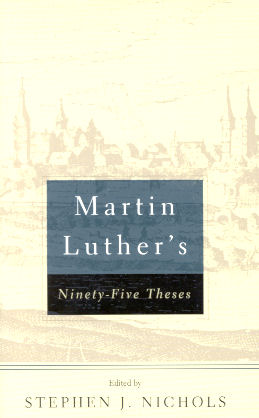
Order Martin Luther’s Ninety-Five Theses here.
April 26, 2017
Martin Luther’s Ninety-Five Theses
Review by Esther Moberg

As a Lutheran, in the past I often referred to the “95 Theses” but had never actually read Martin Luther’s Ninety-Five Theses in their entirety.
Martin Luther wrote the theses and nailed them to the church door with the intention that they would be a starting point for debate with other church leaders or scholars. However, the debate never happened. Instead, Luther set the Catholic world on fire and started a revolution that became the Protestant church. A lot of the Ninety-Five Theses were in direct response to the new indulgences that were being sold by Tetzel, which he said forgave past, present, and future sins without any acts of repentance or penitence. Luther saw this as a direct contradiction to what the Bible said about repentance as well as what the Catholic Church taught about repentance. Now, instead of works of merit or repentance, you could simply buy your way free, and the burden was simply on being able to afford it. It was all about you, and there was nothing about the essential working of salvation and redemption to the process any more. In the Ninety-Five Theses, Luther doesn’t outright condemn all indulgences. It was the start of the process for him to untangle what he thought about them, and it wasn’t until later on that he realized he shouldn’t have continued to affirm the pope and indulgences and changed his viewpoint on these things and others.
Martin Luther had struggled his whole life to find freedom from feeling unworthy and sinful. To buy your way free went against everything he had struggled with. His Ninety-Five Theses helped him and other Catholics to start defining and discussing that the Church had begun to sell doctrine, turning theology into a money-making scheme. From this, Luther went back to what were to him the essentials of the faith—that grace and forgiveness were through Christ and the Word alone, not the Church.
The Ninety-Five Theses are very interesting to read, especially since so many of them are immersed in the world of Catholic theology at the time of 1517. This version I read, with edits by Stephen J. Nichols, had some interesting additions of notes that helped to describe the background of what was going on with each of the theses and what each was in response to.
Reading of the Ninety-Five Theses feels like a dipping of a toe in the waters of a much deeper theological and historical context, and I recommend following it with reading of further works by Martin Luther as he develops his thoughts more thoroughly based on his study of Scripture and moves further away from the practices of the Catholic Church.
Esther MobergAFLBS Alumni/Former AFLC Schools LibrarianSeaside, OR
Order your hardcover copy here: Ambassador Publications Online Store
Also Available:

Order Martin Luther’s 95 Theses here.

Order Luther’s Ninety-Five Theses here.

Order The Reformation: How a Monk and a Mallet Changed the World here.
